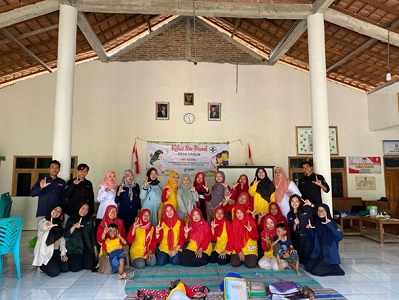Save Toddlers from Nutritional Problems, IPB University Students Assist Mothers to Make Simple Processed Complementary Foods

In an effort to control nutritional problems in toddlers, the involvement of academics is very important. For this reason, students of IPB University’s Innovation Real-Thematic Work Lecture (KKN-T) designed an innovative program in the form of training in making various processed complementary foods (MPASI).
“As much as 60 percent of feeding in Indonesia is still not appropriate, especially in children. In fact, two out of three deaths in toddlers are caused by incorrect infant feeding. This condition motivates us to hold education related to complementary food,” said Azzahra as Village Coordinator (Kordes) Innovation Real-Thematic Work Lecture IPB University.
She said that various processed complementary foods are made using simple ingredients that are rich in nutrients. Complementary food is needed because babies need additional energy, protein and iron. The increase in needs as the baby gets older cannot be obtained by consuming only breast milk.
Furthermore, this community service program is focused on children aged 0-24 months. This age is a period of rapid growth and development that is referred to as the ‘golden period’ or ‘window of opportunity’.
Participants showed a very high level of enthusiasm in participating in the activity, as evidenced by the presence of all participants during the activity. This is because this activity is designed by providing interesting educational media, in the form of leaflets and various door prizes that can be obtained by answering questions asked by the speaker.
This activity is in collaboration with the cadres of Family Welfare Empowerment (PKK) of Dasun Village, Lasem District, Rembang Regency, targeting pregnant women and mothers of children under two years old.
“The main objective of this activity is to optimize the role of the community by providing education about toddler nutrition accurately and precisely. This is to improve the quality of care for mothers and toddlers, and to ensure that food and nutrition needs are met,” said Azzahra.
She hopes that through this activity, changes in community behaviour can be created that reflect high nutritional awareness in the family. (*/Rz) (IAAS/NVA)



